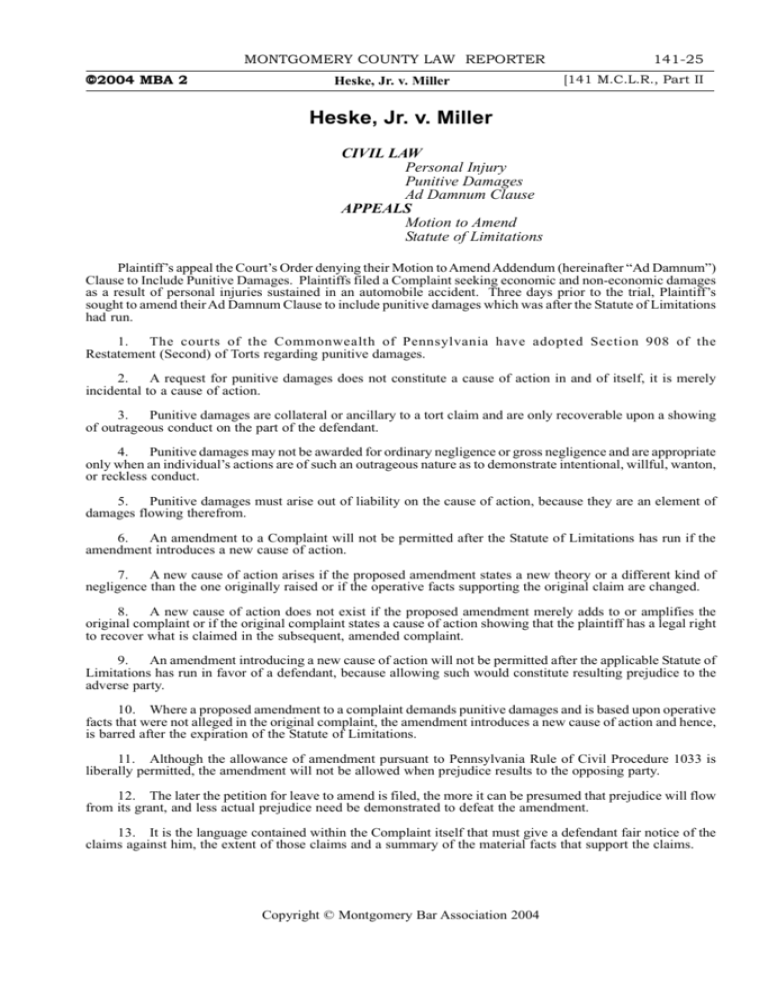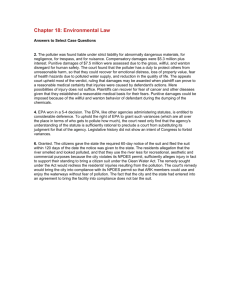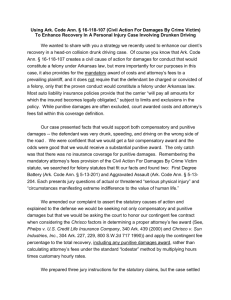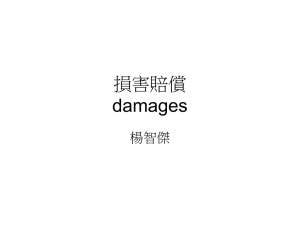Heske, Jr. v. Miller, FURBER, J., July 23, 2003
advertisement

MONTGOMERY COUNTY LAW REPORTER ©2004 MBA 2 Heske, Jr. v. Miller 141-25 [141 M.C.L.R., Part II Heske, Jr. v. Miller CIVIL LAW Personal Injury Punitive Damages Ad Damnum Clause APPEALS Motion to Amend Statute of Limitations Plaintiff’s appeal the Court’s Order denying their Motion to Amend Addendum (hereinafter “Ad Damnum”) Clause to Include Punitive Damages. Plaintiffs filed a Complaint seeking economic and non-economic damages as a result of personal injuries sustained in an automobile accident. Three days prior to the trial, Plaintiff’s sought to amend their Ad Damnum Clause to include punitive damages which was after the Statute of Limitations had run. 1. The courts of the Commonwealth of Pennsylvania have adopted Section 908 of the Restatement (Second) of Torts regarding punitive damages. 2. A request for punitive damages does not constitute a cause of action in and of itself, it is merely incidental to a cause of action. 3. Punitive damages are collateral or ancillary to a tort claim and are only recoverable upon a showing of outrageous conduct on the part of the defendant. 4. Punitive damages may not be awarded for ordinary negligence or gross negligence and are appropriate only when an individual’s actions are of such an outrageous nature as to demonstrate intentional, willful, wanton, or reckless conduct. 5. Punitive damages must arise out of liability on the cause of action, because they are an element of damages flowing therefrom. 6. An amendment to a Complaint will not be permitted after the Statute of Limitations has run if the amendment introduces a new cause of action. 7. A new cause of action arises if the proposed amendment states a new theory or a different kind of negligence than the one originally raised or if the operative facts supporting the original claim are changed. 8. A new cause of action does not exist if the proposed amendment merely adds to or amplifies the original complaint or if the original complaint states a cause of action showing that the plaintiff has a legal right to recover what is claimed in the subsequent, amended complaint. 9. An amendment introducing a new cause of action will not be permitted after the applicable Statute of Limitations has run in favor of a defendant, because allowing such would constitute resulting prejudice to the adverse party. 10. Where a proposed amendment to a complaint demands punitive damages and is based upon operative facts that were not alleged in the original complaint, the amendment introduces a new cause of action and hence, is barred after the expiration of the Statute of Limitations. 11. Although the allowance of amendment pursuant to Pennsylvania Rule of Civil Procedure 1033 is liberally permitted, the amendment will not be allowed when prejudice results to the opposing party. 12. The later the petition for leave to amend is filed, the more it can be presumed that prejudice will flow from its grant, and less actual prejudice need be demonstrated to defeat the amendment. 13. It is the language contained within the Complaint itself that must give a defendant fair notice of the claims against him, the extent of those claims and a summary of the material facts that support the claims. Copyright © Montgomery Bar Association 2004 141-26 MONTGOMERY COUNTY LAW REPORTER 17 2004] Heske, Jr. v. Miller ©2004 MBA 14. The tests for determining when an amended complaint presents a different cause of actions which is therefore barred are: whether a judgment would foreclose any action on either; whether the same measure of damages supports both; whether the same defenses are available in each; and whether the same measure of proof is required. (Appealed to Superior Court May 20, 2003.) C. P. Montgomery County, Civil Division. No. 01-18813. Theodore Heske, Jr. and Marie Heske, h/w v. Jerry A. Miller. Edward Rubin and Steven Barrett, of Hamburg, Rubin, Mullin, Maxwell & Lupin, P.C., for the Plaintiffs/Appellants Theodore Heske, Jr. and Marie Heske. Michael Saltzburg and Alan J. Charkey, for the Defendant/Appellee Jerry A. Miller. FURBER, J., July 23, 2003 This Opinion is necessitated as a result of the Plaintiffs’ appeal of our Order dated May 14, 2003, which denied the Plaintiffs’“Motion to Amend Addendum [hereinafter “Ad Damnum”] Clause to Include Punitive Damages.” The Order was certified as a Final Order pursuant to Pennsylvania Rule of Appellate Procedure 341 (c ). FACTS AND PROCEDURAL HISTORY On December 4, 2000, while the Plaintiff, Theodore Heske, was waiting to make a left-hand turn from Skippack Pike onto Forty Foot Road in Skippack, Montgomery County, Pennsylvania, his 1987 Jeep Cherokee was struck from behind by a car driven by the Defendant, Jerry Miller. On September 11, 2001, the Plaintiff filed a Complaint seeking to recover economic and non-economic damages as a result of personal injuries he allegedly sustained in the accident. The Complaint also contained a claim for Loss of Consortium on behalf of the Plaintiff’s wife, Marie Heske. On Friday May 9, 2003, three days prior to the commencement of trial, the Plaintiffs filed a “Motion To Amend Ad Damnum Clause to Include Punitive Damages.” Immediately prior to trial, on Monday May 12, 2003, the Court heard oral argument on the Plaintiffs’ Motion. Plaintiffs assert that they should be permitted to amend their Complaint, albeit beyond the applicable two-year Statute of Limitations, so as to include a claim for punitive damages. No punitive damage claim had previously been raised at any time in the pleadings, nor had the Plaintiffs requested punitive damages during the Court’s pre-trial settlement conference. The Complaint, filed on September 11, 2001, contains allegations of simple negligence only. This Court conducted oral argument on the sole issue of whether or not to grant the Plaintiffs’ permission to amend their Complaint on the day of trial to add the claim for punitive damages. The addition of punitive damages, at the moment of trial, became of paramount importance because the Defendant conceded liability and trial was to be held solely on the claim for compensatory damages. Following our denial of Plaintiffs’ Motion, we certified our May 14th Order as Final pursuant to P.R.A.P. 341 (c ), so as to avoid the prospect of a multiplicity of trials. On May 20, 2003, the Plaintiffs’ filed a timely appeal with the Superior Court. Copyright © Montgomery Bar Association 2004 MONTGOMERY COUNTY LAW REPORTER ©2004 MBA 2 Heske, Jr. v. Miller 141-27 [141 M.C.L.R., Part II ISSUE The Plaintiffs raise one Issue in their Concise Statement Of Matters Complained Of On Appeal pursuant to Pennsylvania Rule of Appellate Procedure 1925(b): Did the Trial Court err in refusing to allow Plaintiffs to amend their Complaint after the statute of limitations had run to add punitive damages to the Ad Damnum clause based upon evidence that the Defendant was allegedly driving under the influence of alcohol at the time of the accident in question? THE COURT DID NOT ERR IN DENYING THE PLAINTIFFS’ MOTION TO AMEND THE AD DAMNUM CLAUSE TO ADD PUNITIVE DAMAGES AFTER THE STATUTE OF LIMITATIONS HAD RUN, BECAUSE THE OPERATIVE FACTS AS PLEADED IN THE COMPLAINT DO NOT SUPPORT A CLAIM FOR PUNITIVE DAMAGES. This Court finds that its above-stated conclusion is supported in this case by an understanding of the relationship between the following legal concepts: (1) punitive damages; and, (2) when a proposed amendment to a complaint states a new theory or different degree of negligence beyond the statute of limitations. I. Punitive Damages [1] The courts of the Commonwealth of Pennsylvania have adopted Section 908 of the Restatement (Second) of Torts regarding punitive damages. See, Chambers v. Montgomery, 411 Pa. 339, 192 A.2d 355 (1963). Section 908 states the following: Section 908. Punitive Damages (1) Punitive damages are damages, other than compensatory or nominal damages, awarded against a person to punish him for his outrageous conduct and to deter him and others like him from similar conduct in the future. (2) Punitive damages may be awarded for conduct that is outrageous, because of the defendant’s evil motive or his reckless indifference to the rights of others. In assessing punitive damages, the trier of fact can properly consider the character of the defendant’s act, the nature and extent of the harm to the plaintiff that the defendant cause or intended to cause and the wealth of the defendant. [2], [3], [4], [5] “A request for punitive damages does not constitute a cause of action in and of itself. Rather, a request for punitive damages is merely incidental to a cause of action.” Nix v. Temple University, 408 Pa.Super. 369, 380, 596 A.2d 1132, 1138 (1991).1 “Punitive damages are collateral or ancillary to a tort claim and are only recoverable upon a showing of ‘outrageous’ conduct on the part of the defendant.” Baker v. Pennsylvania National Mutual Casualty Insurance Company, 522 Pa. 80, 84, 559 A.2d 914, 916 (1989)[emphasis in original].2 Punitive damages may not be awarded for ordinary negligence or gross negligence and are appropriate only when an 1 Citing as authority Feingold v. SEPTA, 512 Pa. 567, 517 A.2d 1270 (1986). 2 By Justice Larson writing “Opinion in Support of Reversal” for an equally divided Supreme Court, and also citing as authority Feingold, Id. Copyright © Montgomery Bar Association 2004 141-28 17 2004] MONTGOMERY COUNTY LAW REPORTER Heske, Jr. v. Miller ©2004 MBA individual’s actions are of such an outrageous nature as to demonstrate intentional, willful, wanton, or reckless conduct. Slappo v. J’s Development Associates, Inc., 791 A.2d 409 (Pa.Super. 2002). “Punitive damages must arise out of liability on the cause of action, because they are an element of damages flowing therefrom.”3 II. Amended Complaint [6], [7], [8], [9], [10] An amendment to a Complaint will not be permitted after the statute of limitations has run if the amendment introduces a new cause of action. Romah v. Hygienic Sanitation Company, 705 A.2d 841 (Pa.Super. 1997)[citations omitted].4 A new cause of action arises if the proposed amendment states a new theory or a different kind of negligence than the one originally raised, or if the operative facts supporting the original claim are changed. Reynolds v. Thomas Jefferson University Hospital, 450 Pa.Super. 327, 338, 676 A.2d 1205, 1210-1211 (1996), appeal denied 549 Pa. 703, 700 A.2d 442 (1996) [citations omitted]. A new cause of action does not exist if the proposed amendment merely adds to or amplifies the original complaint or if the original complaint states a cause of action showing that the plaintiff has a legal right to recover what is claimed in the subsequent, amended complaint. Id. An amendment introducing a new cause of action will not be permitted after the applicable Statute of Limitations has run in favor of a defendant, because allowing such would constitute “resulting prejudice” to the adverse party. Schaffer v. Larzelere, 410 Pa. 402, 407, 189 A.2d 267, 270. (1963). Finally, where a proposed amendment to a complaint demands punitive damages, and “is based upon operative facts that were not alleged in the original complaint, the amendment introduces a new cause of action and hence, is barred after the expiration of the statute of limitations.”5 Discussion Based upon the above-cited interrelated legal propositions for the purpose of deciding this Issue, the Court poses the following question: Do the facts as stated in Mr. and Mrs. Heske’s original Complaint show that they have the legal right to recover punitive damages based upon the alleged intoxication of Jerry Miller? We find that the answer to that question is a negative. The original cause of action in simple negligence, and its operative supporting facts, are pleaded in Plaintiffs’ Complaint at Paragraphs 4 and 5, in pertinent part as follows: 4. At the same time, date, and place, Defendant, Jerry A. Miller, so negligently, recklessly, and carelessly operated a 2000 Mazda 626 in an Easterly direction on Route 73 at or near its intersection with Forty Foot Road, so as to cause said car to come into violent contact with Plaintiff’s vehicle causing certain serious injuries to Plaintiff more fully described hereinafter. 3 Summary of Pennsylvania Jurisprudence 2d, Torts, §9.82, at 393 [citations omitted]. 4 Reargument denied 01-26-98, appeal granted 558 Pa. 601, 735 A.2d 1269, order affirmed 558 Pa. 378, 737 A.2d 249 (1999). 5 GoodrichAmram 2d, vol. 3, § 1033:44, at 223 [citations omitted]. Copyright © Montgomery Bar Association 2004 MONTGOMERY COUNTY LAW REPORTER ©2004 MBA 2 Heske, Jr. v. Miller 141-29 [141 M.C.L.R., Part II 5. At the time of the aforesaid occurrence, Defendant was negligent, reckless, and careless under the circumstances in: (a) failing to have said motor vehicle under proper and reasonable control; (b) operating said motor vehicle in such a manner as to cause it to collide into and against Plaintiff’s vehicle; (c ) failing to give prompt, proper, and adequate warning of Defendant’s approach; (d) operating said motor vehicle without due regard to the presence and safety of Plaintiff; (e) failing to bring said motor vehicle to a stop in time to avoid the afore-mentioned collision; (f) failing to operate said motor vehicle in a safe and proper manner; (g) failing to comply with the laws, rules, and regulations of the Pennsylvania Motor Vehicle Code and the ordinances of Skippack Township pertaining to the operation of motor vehicles in or about such public highways; (h) operating said motor vehicle at a high and excessive rate of speed under the circumstances; (i) failing to otherwise exercise the proper degree of care in regard to the rights and safety of Plaintiff; (j) failing to keep a safe, clear distance to the rear of Plaintiff’s vehicle; and (k) failing to bring his vehicle to a stop before running into the rear end of Plaintiff’s vehicle, which was stopped… WHEREFORE, Plaintiff claims of Defendant, Jerry A. Miller, an amount in excess of the statutory limits for arbitration, plus delay damages.6 On Monday, May 12, 2003, the first scheduled day of trial, the Plaintiffs handed the undersigned a copy of their “Motion to Amend Ad Damnum Clause to Include Punitive Damages,” which Motion had been filed with the Prothonotary’s Office on Friday, May 9th. During oral argument, Plaintiffs’ counsel argued that the original Complaint adequately stated all factual allegations necessary to support a claim for punitive damages and, thus, the Amendment would only be amplifying the type of damages that were requested.7 6 Complaint, 09-11-01, at 2-3, 4. Plaintiff’s wife, Marie Heske, also asserts a derivative claim for the Loss of Consortium at Count II, which is not at issue in this appeal. 7 Notes of Testimony, Pre-Trial Argument, 05-12-03, at 3 [hereinafter, “N.T.”]. Copyright © Montgomery Bar Association 2004 141-30 17 2004] MONTGOMERY COUNTY LAW REPORTER Heske, Jr. v. Miller ©2004 MBA The Court notes that the facts which Plaintiffs sought to infer as the basis for punitive damages were known to all parties on the day of the accident and could have been pleaded on the day the Complaint was filed, to wit: the Defendant allegedly failed a road sobriety test following the collision, his blood alcohol level was allegedly above .30, and he allegedly admitted that he was intoxicated. We are also mindful that the Superior Court has held that, “under the appropriate circumstances, evidence of driving while under the influence of intoxicating liquors may constitute a sufficient ground for allowing punitive damages,” when the actual factual circumstances have been shown to be outrageous misconduct. Focht v. Rabada, 217 Pa.Super. 35, 41-42, 268 A.2d 157, 161 (1970). At no time prior to May 9, 2003, however, when the Motion to Amend was filed by the Heskes, did the Plaintiffs allege in any pleading that the Defendant was intoxicated or acted in an outrageous manner at the time of the accident. In arguing that the Court should permit them to amend their Complaint on the day of trial to include the punitive damage claim, Plaintiffs placed their reliance on the case of Daley v. John Wanamaker, Inc., 317 Pa.Super. 348, 464 A.2d 355 (1983). In Daley, however, no amendment to the factual allegations averred in the original Complaint was needed because the facts, as stated, were for causes of action for assault and battery, defamation, and false imprisonment, each of which as originally pleaded supported a punitive damage request without any further amendment. Such is not the case with the Heskes’ proposed amendment. Plaintiffs’ reliance on two decisions by common pleas courts is also misplaced. Taylor v. Ryder Truck Rental, Inc., 41 Pa.D.&C.3d 396, 400 (1984), holds that if the factual allegations are sufficient, if proven, to support an award of punitive damages, there is no need to use “magic” words such as “outrageous, vindictive, willful or wanton.” The Taylor Complaint, unlike the Heskes’ Complaint, did specifically define the factually dangerous condition sufficient to support a jury’s finding that Defendant Ryder had acted with reckless disregard for the safety of others. Likewise, in Kairamanov v. LaFalce, 35 Pa.D.&C.4th 53 (1997), the trial court permitted the jury to consider punitive damages even though they had not been specifically requested in the Complaint, because the Complaint did specifically allege a series of facts to support the Defendant’s recklessness, intoxication, and violation of Pennsylvania’s “Driving Under the Influence” Statute, 72 Pa.C.S.A. § 3731. Again, the Heskes’ Complaint does not aver any of the elements necessary to support a cause of action from which the jury could award punitive damages based upon a specific violation of the Commonwealth’s DUI Statute. We find, therefore, that punitive damages do not flow from the facts as stated in the Plaintiffs’ original Complaint, notwithstandingnothwithstanding any argument made to the contrary. The allegation in Paragraph 5(g) that the Defendant failed “to comply with the law, rules, and regulations of the Pennsylvania Motor Vehicle Code,” does not infer a fact that was not pleaded: that the Defendant was intoxicated at the time of the accident, which intoxication was outrageous behavior that caused the accident. An allegation of intoxication would have, in fact, changed the underlying cause of action insofar as it pertained to legal causation and liability, as the cases cited by the Plaintiffs so indicate. Thus, although the allowance of amendment pursuant to Pennsylvania Rule of Civil Procedure 1033 is liberally permitted, the amendment will not be allowed when prejudice results to the opposing party. The later the petition for leave to amend is filed, the more it can be presumed that prejudice will flow from its grant, and less actual prejudice need be demonstrated to defeat the amendment. Newcomer v. Civil Service Commission of Fairchance Borough, 100 Pa.Cmwlth. 559, 565, 515 A.2d 108, 111 (1986), appeal denied 514 Pa. 626, 522 A.2d 51 (1987). Here, the Defendant’s entire theory in defending his case would be affected by the allegation of intoxication, as indicated by his counsel during oral argument.8 Defense counsel suggested that Mr. Miller would need advice from his insurance carrier as to whether or not a punitive damage claim would even be covered under his policy, because an insurer’s obligation to defend is fixed solely by allegations in the underlying complaint. Aetna Casualty and Surety Company v. Roe, 437 Pa.Super. 414, 422, 650 A.2d 94, 8 N.T., Id., at 12. Copyright © Montgomery Bar Association 2004 MONTGOMERY COUNTY LAW REPORTER ©2004 MBA 2 Heske, Jr. v. Miller 141-31 [141 M.C.L.R., Part II 98 (1994)[citations omitted]. The Superior Court has consistently held, in fact, that “an insurer owes no duty to indemnify an insured on an award of punitive damages. There is no functional distinction or difference between punitive damages which arise from intentional conduct or reckless conduct. It is the conduct that is being punished, not the victim that is being compensated.” Creed v. Allstate Insurance Company, 365 Pa.Super. 136, 141-142, 529 A.2d 10, 12 (1987), appeal denied 517 Pa. 616, 538 A.2d 499 (1988)[citations omitted]. Additionally, further discovery would be needed regarding Mr. Miller’s potential defense to the alleged intoxication or other outrageous misconduct in the event that he subsequently decides to contest liability at trial.9 [13] The Plaintiffs’ contention that Defendant Miller had notice that his alleged intoxication at the time of the accident might support a claim for punitive damages is irrelevant. Pennsylvania is a fact-pleading state, and the facts as Plaintiffs have pleaded them do not state that Mr. Miller was either intoxicated or acted in an egregious, outrageous manner. It is the language contained within the Complaint, itself, that must give a defendant fair notice of the claims against him, the extent of those claims, and a summary of the material facts that support the claims. Rachlin v. Edmison, 813 A.2d 862, 870 (Pa.Super. 2002)[citations omitted]. [14] In summary, this Court adopts the rationale espoused by the Superior Court in Frey v. Pennsylvania Electric Company, 414 Pa.Super. 535, 540, 607 A.2d 796, 798 (1992), appeal denied 532 Pa. 645, 614 A.2d 1142 (1992): “We have held that tests for determining when an amended complaint presents a different cause of action, which is therefore barred, are: whether a judgment would foreclose any action on either; whether the same measure of damages supports both; whether the same defenses are available in each; and whether the same measure of proof is required.”10 For the reasons articulated above, the Court finds that the Plaintiffs’ proposed amendment to the Ad Damnum clause does not flow from the facts as stated in their Complaint. The amendment would require the Court to infer new operative facts stating a new theory of recovery, for a different degree of negligence, allowing a greater measure of damages, thereby resulting in a more complex defense, all of which is impermissible because the Statute of Limitations has expired. The Court’s Order of May 14th, 2003 denying the Plaintiffs’ “Motion to Amend Ad Damnum Clause to Include Punitive Damages” was not an abuse of discretion and should be AFFIRMED. The Plaintiffs’ appeal of our Order should be dismissed. (Appealed to Superior Court May 20, 2003.) 9 Id. 10 Citing as authority Hogden v. Summers, 382 Pa.Super. 348, 350-351, 555 A.2d 214, 215 (1989)[citations omitted]. Copyright © Montgomery Bar Association 2004 141-32 17 2004] MONTGOMERY COUNTY LAW REPORTER NOTES: Copyright © Montgomery Bar Association 2004 ©2004 MBA








